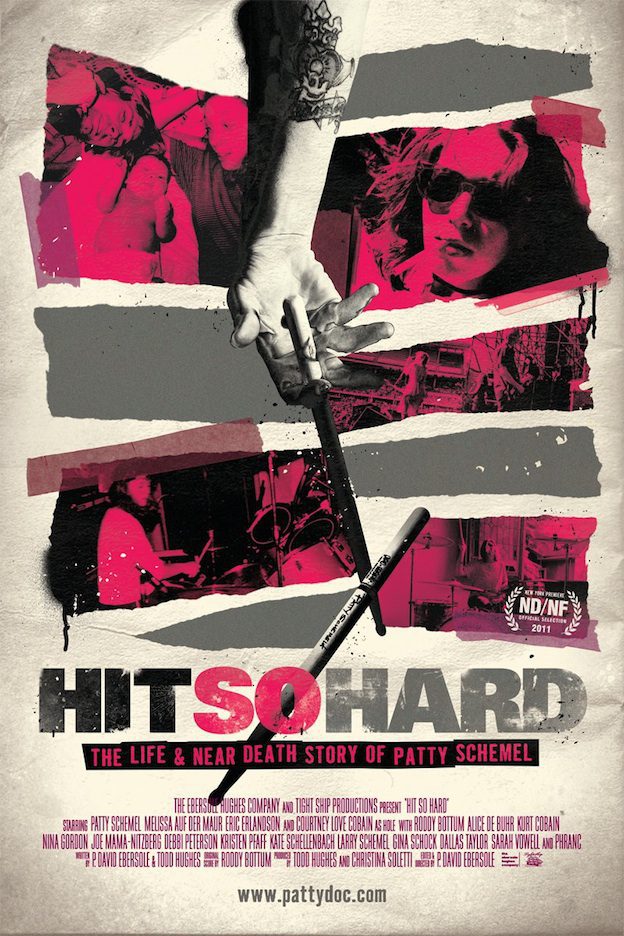
I’ve been on a bit of a grunge binge lately. It could be that the onset of certain anniversaries, observed by nearly everyone who cared about music in the mid-nineties, turns collective thought to the anti-heroes of the genre who destroyed themselves in the process of creating it. But for all the stars that burn out, there are some who reticently fade away – at least, until now. One of those stars is Patty Schemel, drummer of Hole. I was lucky enough to meet Patty (along with bassist Melissa Auf der Mar and guitarist Eric Erlandson) at a book signing just a few weeks ago, and it was there I became aware of another Hole-related project – a documentary entitled Hit So Hard: The Life and Near Death Story of Patty Schemel.
Hit So Hard is certainly unique in its focus. Though a drummer’s playing is the heartbeat that propels any song, drummers are so often pushed to the back of the stage, hidden behind a shiny kit, while more prominent players soak up the spotlight. Renowned in Seattle circles for her powerful drumming long before becoming a part of Hole, Patty Schemel struggled with alcohol abuse while exploring her sexual identity, and with that came a deep pain that made her work as a musician that much more honest and immediate. With very few female role models in her situation (the handful of them, including Alice de Buhl of Fanny, Debbie Peterson of the Bangles, Gina Schock of the Go-Go’s, and Kate Schellenbach of Lucious Jackson, are interviewed in the film), Patty fearlessly blazed new trails with each twirl and flourish of the sticks. But as Hole began their meteoric rise to rock stardom, that very trail became a treacherous one, filled with tragic death and out-of-control addictions.
Schemel’s story packs a huge punch, but filmmakers David Ebersole and Todd Hughes don’t present it with a flow that’s concise enough, fidgeting around from subject to subject with jolting affect. Schemel’s extraordinary life is offered in dissected segments which fail to render her life cohesively. The sophomoric use of hot-pink title cards in punk-rock fonts are intensely grating and make the whole film feel like a series of movie trailers for a documentary that never happens.
That being said, the doc has two things going for it. First, the breadth of interviews with those who were closest to Schemel is commendable, including her bandmates from Hole (even Courtney Love appears in all her plasticized “glory”), friends from the Seattle music scene, and some very candid commentary from her family members. Secondly, parts of the documentary focused on the most nostalgic era of grunge are culled from personal footage that Schemel captured with a camcorder she was given while on tour. But the footage she captured is not just tour footage – there are hours of heart-rending home videos of Kurt and Courtney just after the birth of their daughter, Frances Bean, filmed when Patty lived with them in Seattle. We see the fragility of this family unit, knowing the future in a way the subjects could not when the footage was shot. It is equal parts beautiful and tragic, and serves as a reminder of how integral Schemel was to the drama that would later play out.
And while most can give at least a brief summary of the somber fate of Kurt Cobain, original Hole bassist Kristen Pfaff, or many of the other heroin casualties of that era, Schemel’s story has been obscured for years. Hole’s popularity went through a resurgence after the release of 1998’s Celebrity Skin, and while Schemel was featured in promotional photos from the era, punishing producer Michael Beinhorn took the drum parts she had written and replaced her recordings with those of session drummer Deen Castronovo. Understandably, this sent Schemel into a spiral of self-doubt resulting in her departure from the band, followed tragically by relapse, homelessness and prostitution. As someone who idolized this band, listened to that album on repeat, and never knew that Schemel had been replaced by a hired gun, this was the one thing that was extremely shocking to me – I’d always thought I was listening to Schemel on the record, not some beefed-up jock completely unconnected to the compositions or the group dynamic. I felt almost ashamed that I hadn’t even noticed the awkward doppelgangers standing in for Schemel in music videos, and was appalled that none of her bandmates stepped into help her while she was living on the streets and Hole was living it up.
But Schemel’s story ends on a happier note; these days she passes on her drumming skills as a music teacher (several of her students are interviewed, which is kind of mind-blowing) and rehabilitating stray dogs. She’s survived the storm of making it big in a heroin-addled rock band and lived to tell the tale. Even if her story is presented in a somewhat sloppily cobbled package courtesy of the filmmakers, it is still a compelling piece of rock-n-roll history well worth telling.
[fusion_builder_container hundred_percent=”yes” overflow=”visible”][fusion_builder_row][fusion_builder_column type=”1_1″ background_position=”left top” background_color=”” border_size=”” border_color=”” border_style=”solid” spacing=”yes” background_image=”” background_repeat=”no-repeat” padding=”” margin_top=”0px” margin_bottom=”0px” class=”” id=”” animation_type=”” animation_speed=”0.3″ animation_direction=”left” hide_on_mobile=”no” center_content=”no” min_height=”none”][jwplayer config=”AF01 YT” mediaid=”793″][/fusion_builder_column][/fusion_builder_row][/fusion_builder_container]


